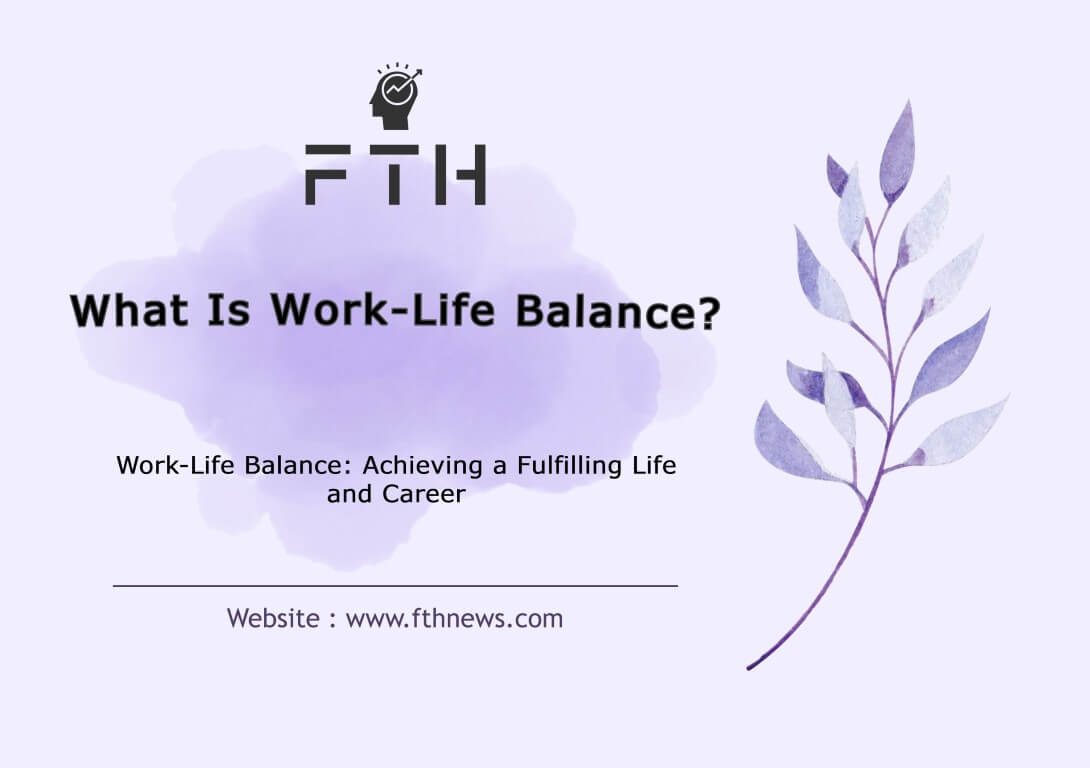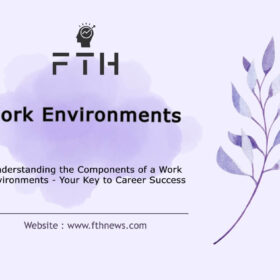
Work-Life Balance: Achieving a Fulfilling Life and Career
Work-Life Balance Many of us want to succeed, and we spend a lot of time at work to achieve our goals. But often, this leaves little time for our personal lives. Sometimes, it can feel like work is all we ever do.
In today’s world, work can take over. You might get work calls after work hours, have to answer emails during your free time, or be stuck working when your friends are having fun.
You might even find yourself worrying about reports when you should be enjoying time with friends. If this sounds familiar, your work-life balance is off.
In this article, we’ll talk about work-life balance, why it’s important, and how you can make it better.
What Is Work-Life Balance?
Work-life balance means finding a balance between your job and your personal life. It’s about managing your time and energy effectively so that you can fulfill your work responsibilities and also have time for personal activities, like spending time with family, enjoying hobbies, and relaxing.
It’s essential for staying motivated at work and enjoying your life outside of work.
The Benefits of Work-Life Balance
Having good work-life balance can lead to better productivity and job satisfaction.
Happy employees tend to perform better, which benefits both them and their companies.
If your workplace doesn’t prioritize work-life balance, it’s worth discussing this with your supervisor to achieve better results and satisfaction.
Work-life balance offers numerous advantages that affect both individuals and their employers. Here are some key benefits:
Improved Health:
Maintaining a balance between work and personal life can lead to better physical and mental health. When you’re not constantly stressed and overworked, you’re less likely to experience health issues such as high blood pressure, insomnia, and chronic fatigue.
Example: Having time to exercise regularly and prepare nutritious meals can lead to better fitness and overall well-being.
Severe stress and a lack of work-life balance can impact not only your mental health but also your physical well-being. High levels of stress can lead to health issues, including high blood pressure, which, in turn, can increase the risk of serious heart problems. To illustrate this, consider the case of a financial intern at the Federal Reserve Bank of America in 2013, who suffered a heart attack due to the intense pressure and demands of their work.
In Japan, this issue is so prevalent that they even have a term for it, “Karoshi,” which translates to “death from overwork.”
Moreover, leading a sedentary lifestyle is far from healthy. If you spend most of your time at a desk and struggle to find time for exercise and a balanced diet, you’re setting yourself up for health problems in the future due to the disruption of your work-life balance.
Enhanced Productivity:
Content and relaxed employees tend to be more productive. When you have time for leisure and personal activities, you return to work with a fresh perspective, which can lead to better problem-solving and creative thinking.
Example: After enjoying a relaxing weekend with family, you may return to work on Monday with renewed energy and motivation, ready to tackle tasks more efficiently.
Job Satisfaction:
A healthy work-life balance often leads to increased job satisfaction. When you feel in control of your time, you’re more likely to find fulfillment in your work.
Example: If your job allows you to maintain a balance, you’re more likely to enjoy your work and feel enthusiastic about your responsibilities.
In today’s world, job satisfaction has become just as significant as one’s salary. Thus, the importance of pursuing work that you genuinely enjoy cannot be underestimated. Nevertheless, if your job begins to encroach on your personal life, disrupting your work-life balance, it can transform something you were passionate about into a nightmarish experience.
As in all aspects of life, the secret to relishing life lies in the ability to step away from your passion temporarily. When you detach from the work environment upon leaving the office each day, you free up that positive energy to focus on other facets of your life, ultimately fostering a healthier work-life balance.
Stronger Relationships:
A balance between work and personal life enables you to nurture and maintain strong relationships with family and friends. Quality time spent with loved ones fosters deeper connections and emotional well-being.
Example: By regularly spending time with your family, you can build and strengthen bonds, creating a supportive and loving environment.
This formula is a well-established theme in many Hollywood movies and TV series. The main character is often portrayed as highly intelligent and successful professionally but struggles to maintain a healthy work-life balance.
A prime example is the character of Harvey Specter in the TV series “Suits.” He is depicted as the best corporate lawyer in New York, but his emotional detachment and inability to sustain personal relationships, whether romantic or otherwise, take a toll on his overall well-being.
When work takes precedence as your top priority, it becomes challenging, if not impossible, to nurture serious and meaningful relationships, even when family and children are involved. Our personal relationships have a profound impact on our lives, more so than any other aspect.
Therefore, ensuring that we allocate enough time to nurture these relationships is not only essential for our happiness but also crucial for our personal growth and development.
Reduced Burnout:
Overworking and ignoring personal life often lead to burnout. Proper work-life balance helps prevent this emotional and physical exhaustion.
Example: Avoiding excessive overtime and taking regular breaks allows you to avoid burnout and maintain a sustainable work pace.
Career Growth:
Achieving work-life balance doesn’t hinder your career; it can actually promote long-term growth. Content employees tend to be more committed and loyal to their employers.
Example: By maintaining a balance, you can avoid burnout and remain focused on your career goals, steadily advancing over time.
Enhanced Creativity:
When you have time for personal interests, hobbies, and relaxation, you’re more likely to discover new perspectives and creative insights.
Example: Pursuing a hobby like painting or writing can spark creativity, which might lead to innovative ideas in your work.
Greater Emotional Well-Being:
Work-life balance contributes to a sense of well-being and life satisfaction, reducing stress and anxiety.
Example: Engaging in regular meditation can help you manage stress and maintain emotional stability.
Attracting and Retaining Talent:
Companies that prioritize work-life balance are more likely to attract and retain top talent. Job seekers often look for employers who support a balanced lifestyle.
Example: A company offering flexible work hours and telecommuting options can be more appealing to potential employees.
Enhanced Reputation:
Organizations that prioritize their employees’ work-life balance tend to have a better reputation. This can lead to increased customer trust and support.
Example: Customers may choose to support a business known for its positive work culture, leading to higher sales and success.
Your work-life balance also benefits the company
A widely acknowledged fact, which is fortunately gaining recognition among many companies, is that work-life balance holds significant importance.
A tired and stressed employee pushed to their limits is unlikely to be a productive and effective contributor to any organization.
It’s in the best interest of companies to ensure that their employees maintain good health, arrive at work refreshed, and are prepared to carry out their daily tasks. This can be achieved through wellness and mindfulness programs.
Regrettably, not all companies adhere to this principle. Some organizations demand excessive dedication from their employees, leading to burnout or high turnover rates. As previously mentioned, if you find yourself in such a situation, consider seeking employment at a company that values and prioritizes your well-being.
Characteristics of a Healthy Work-Life Balance
A healthy work-life balance includes:
Setting Boundaries: Clearly defining your work hours and personal time.
Time Management: Efficiently organizing and prioritizing tasks to have time for both work and personal activities.
Stress Management: Coping with stress through mindfulness, exercise, and taking breaks.
Flexibility: Adjusting your schedule for personal needs without compromising work commitments.
Why Is Work-Life Balance Important?
Overworking can lead to burnout, fatigue, and health issues. It may result in more work hours but less productivity. A balanced work-life keeps you healthy, motivated, and effective in your career.
Signs of an Unhealthy Work-Life Balance
Unhealthy work-life balance is when work overwhelms your personal life. Signs include:
- Overworking regularly.
- Neglecting personal life, relationships, and hobbies.
- Burnout from chronic stress.
- Lack of self-care.
- Strained relationships with family and friends.
How to Improve Work-Life Balance
Achieving a balanced life is a personal journey. Here are 12 tips:
Plan Ahead: Combine work with personal activities.
Embrace Productivity: Use focused work sessions.
Set Time Blocks: Allocate specific times for different tasks.
End Work on Time: Define a work end time.
Use Technology to Disconnect: Block distracting websites and work tools.
Take Lunch Breaks: Step away from work for lunch.
Take Time Off: Prioritize sick leave, personal time, and vacations.
Practice Mindfulness: Stay in tune with your emotions and physical sensations.
Engage in Hobbies: Find activities you love outside of work.
Reconsider Your Work: Evaluate if your work aligns with your interests and values.
Communicate with Your Manager: Discuss your workload honestly.
Work with a Coach or Therapist: Seek professional guidance for lasting change.
How Managers Can Support Work-Life Balance
Managers can help employees by encouraging them to unplug during vacations, creating social opportunities, educating them about benefits, checking on their well-being, setting an example, shaping company culture, and respecting working hours.
Finding Work-Life Balance While Working Remotely
Remote work can make it challenging to separate work and personal life. It’s important to set boundaries, disconnect from work devices, and create transitions between work and leisure.
Ways to Balance Work and Life
Determine What’s Important: Identify the things that truly matter to you, whether it’s your health, hobbies, or spending time with loved ones. Prioritize what brings you happiness in your personal life.
Include Rest Time in Your Schedule: Make time for breaks in your work schedule to maintain balance. Avoid overworking yourself, as it can lead to fatigue and stress. Regular breaks can help you relax and recharge.
Set Specific Work Hours: Stick to your official working hours, whether they are set by your company or self-imposed. Avoid overtime and rushing through tasks. Leaving work on time is crucial for your well-being.
Don’t Take Work Home: After your work hours, leave your professional duties at the office. Disconnect from work-related emails and tasks when you’re at home. Write down your to-do list for the next day to keep track of your work.
Adopt a Healthier Lifestyle: Prioritize your health by eating well, staying hydrated, and making time for exercise. Neglecting your health can negatively impact both productivity and work-life balance.
Get Enough Sleep: Determine your ideal amount of sleep and establish a sleep routine. Persistent sleep deprivation can harm your health and work performance. Strive for 6 to 10 hours of sleep based on your needs.
Manage Your Time Carefully: Use time management tools to boost productivity. Techniques like the Pomodoro method can help you focus on tasks for specific durations and maintain better time management.
Delegate Tasks: Delegate some of your work to colleagues or interns to reduce your workload. At home, consider involving family members or hiring help for household chores to alleviate mental pressure.
Set Career Goals:
Define career goals that align with your aspirations, whether it’s career advancement, a higher salary, or a more fulfilling job. Your ideal career goal should enhance your personal life too.
Plan Your Vacation: Take scheduled vacations to ensure your mind and body get the rest they need. Skipping vacations can lead to reduced productivity. Breaks help you regain energy and return to work with higher productivity, ultimately benefiting your work-life balance.
Conclusion
Recognizing an imbalance between work and personal life is the first step to improving it. Small daily or weekly habits can gradually lead to a healthier work-life balance. If you need assistance, consider coaching for guidance.
FAQ
Work-life balance is a state where individuals effectively manage their career and personal life, ensuring that neither overshadows the other, leading to reduced stress and improved overall well-being.














